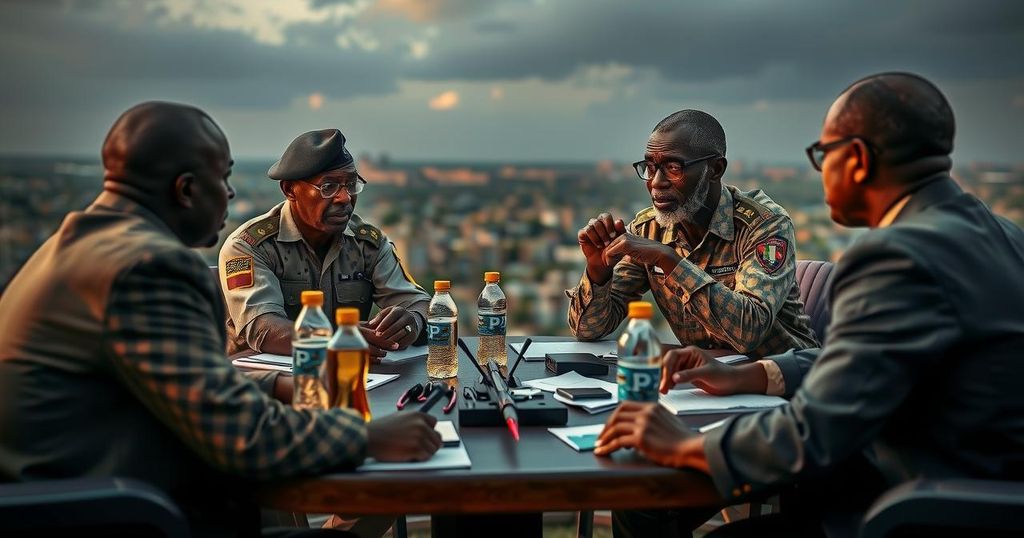President Kiir, Sudan’s al Burhan Discuss Oil and Border Security

On December 4, 2024, South Sudan’s President Salva Kiir and Sudan’s General Abdel-Fattah Al-Burhan met in Juba to discuss cooperation on oil, trade, and border security. The leaders aim to strengthen bilateral relations and address mutual issues amidst ongoing tensions in Sudan. Key officials participated in discussions, underscoring the significance of this diplomatic meeting.
On December 4, 2024, South Sudan’s President Salva Kiir and General Abdel-Fattah Al-Burhan, the Chairman of Sudan’s Transitional Sovereignty Council, convened in Juba to discuss collaboration regarding oil, trade, and border security. The meeting aimed to enhance bilateral relations and address mutual interests. Majak Filmon Majok, South Sudan’s Undersecretary of Foreign Affairs, expressed optimism regarding the visit’s potential to bolster ties between the two nations, emphasizing the shared challenges they face. The discussions included updates on the ongoing conflict in Sudan, which has escalated since the beginning of 2023, as President Kiir received a briefing on the situation. Furthermore, the gathering included various Sudanese officials, including the Minister of Energy and Oil and the Director General of the General Intelligence Service, underscoring the strategic importance of this diplomatic engagement.
The engagement between South Sudan and Sudan comes amid a backdrop of complex historical relations characterized by periods of both cooperation and tension. Since gaining independence in 2011, South Sudan has faced numerous challenges, including economic instability and ongoing security concerns, which are heightened by conflicts in neighboring Sudan. The discussions on oil and border security are particularly significant given the intertwined economies of the two nations, where oil resources play a crucial role. Given that landlocked South Sudan relies heavily on Sudanese pipelines for oil exports, cooperation in this sector is vital for both countries to enhance their economic stability and security.
“The closed meeting mainly focused on joint issues between the two countries, cooperation files, and bilateral relations,” stated Sudanese Ambassador to Juba, Lt. Gen. Issam-Eddin Karar, hinting at the focus of their discussions.
There are currently no hyperlinks referenced within the article.
In conclusion, the meeting between President Salva Kiir and General Abdel-Fattah Al-Burhan represents a significant step toward enhancing collaboration between South Sudan and Sudan. By addressing key issues such as oil production, trade facilitation, and border security, both nations aim to revitalize bilateral relations to better serve the interests of their peoples. This diplomatic engagement is crucial in light of ongoing instability in Sudan and reaffirms the need for cooperation in navigating shared challenges effectively.
President Kiir, Sudan’s al Burhan Discuss Oil, Border Security
The diplomatic relationship between South Sudan and Sudan has evolved dramatically since South Sudan’s independence in 2011. Both countries share a historical bond, yet have encountered myriad conflicts and disagreements, particularly regarding border demarcations and oil resources. The economic foundations of both nations are intricately linked, making the dialogue surrounding oil production and border security pivotal for mutual stability. Furthermore, Sudan has been grappling with internal conflict, particularly following the tensions between the Sudan Armed Forces and the Rapid Support Forces, which has further complicated regional dynamics. Given these circumstances, the discussions held in Juba are essential in fostering a cooperative framework aimed at addressing socio-economic and security challenges.
The meeting between Presidents Kiir and al Burhan marks a significant commitment to enhancing cooperation in critical areas such as oil production, trade, and border security. With the complex geopolitical landscape and internal conflicts affecting Sudan, both leaders recognize the importance of fostering robust bilateral relations that are responsive to the needs of their countries. This dialogue sets a hopeful precedent for future interactions, emphasizing the necessity for collaboration in achieving regional stability and prosperity.
Original Source: sudantribune.com








